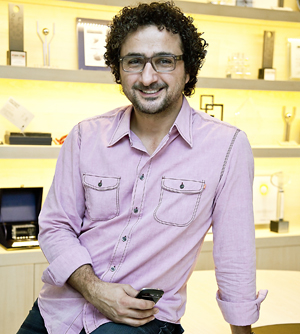Even though the concept art for phones tied to computers dates back to 1973, the first use of the phrase “smart phone” was for introducing Ericsson’s GS 88 in 1997.
A decade later, the concept Steve Jobs unveiled as “a widescreen iPod with touch controls… a revolutionary mobile phone… a breakthrough Internet communications device” all within one device changed the understanding of how we do business, and even live our lives. Experts may keep bickering about “internet addiction” and “phone addiction” all they want; it is impossible to communicate with the smart world without a smart phone. Many consumers, and even the young future consumers, carry around a giant economy in the shape of a phone. After all, we are living in a world in which the iPhone 5, released on September 21, sold over 5 million in 9 countries over one weekend.
Accordingly, last week’s report published in sosyalmedya.co demonstrated that the giants of the web agree on one trend for 2013: Mobile!
Especially intriguing were the numbers Fırat Dirik shared from Facebook’s London office, which, due to their sheer volume, let us make better predictions about the upcoming year. Last year Facebook brought in 225 monthly users on mobile. Half of the Turkish users—approximately 14 million of them—switched to mobile, and the numbers are increasing every day. That is why Facebook is being developed as “mobile first”.
In total, 543 million global Facebook users—14 million of whom are from Turkey—are twice as active as their web counterparts. “If we look at web users, over 54 percent… spend 6 days of the week on Facebook. Following these developments, the ability of brands to reach mobile users directly will become of great value,” said Dirik.
Mark Zuckerberg: “Mobile first!”
Consumers’ fingers and brands’ eyes are fixated on the mobile. Mobilera Co-Founder and VP Marketing Arda Kertmelioğlu, like Dirik, reminds us of Zuckerberg’s strategy: “Mobile first!” Kertmelioğlu remarks that, if we are somehow discussing the future of the most active and valuable media platform, it is because of Facebook’s ambiguity in mobile strategy, and adds: “Think about it. What make Apple the most valuable brand in the world are not the stylish Macs or the iPods, but mobile product services like iOS, App Store, and of course the iPhone and the iPad. This is why the question ‘is mobile Facebook’s kryptonite?’ was raised worldwide.”
Pozitron Founder & CEO Fatih İşbecer agrees with Kertmelioğlu in that the revolution started with Apple’s mobile product services. “The revolution that started with the iPhone and the App Store radically altered every line of business. Every sector is touched by this trend and has to revise existing business models.”
Selim Yörük, Strategic Planning and Product Development Director at 4play, has a different perspective into the matter. “The rise of the mobile did not start with the birth of the smart devices,” Yörük says. “The only thing that changed with the recent rise of the mobile is how we divvy up the cake. Previously, the mobile operators ate the whole cake. Today, application developers and app stores which take the abilities of the mobile devices to a whole new level want their slice. What we call the revolution is our preference for the mobile in satisfying our digital communication needs. It is very easy to just reach into the pocket.”
Over 81 Billion Mobile Application Downloads
When talking about mobile and its future, eyes inevitably turn to mobile operators. Based on the information given us by a very active name in the industry, Turkcell CIO İlker Kuruöz, IDC predicts tablet sales in 2013 will reach 165.9 million. Recent research by Gartner indicates that the mobile application downloads will rise from its current volume of 45 billion to over 81 billion in 2013. Projections show that in three years, the number of mobile connections will reach 6.5 billion. People are talking about how in 2013 mobile devices will replace the PC as the primary access point to the internet. Another research, by IHS Inc., shows that the number of smartphones users will match the number of traditional, feature-free phone users in 2013.
The consensus is that Turkey will be a significant force in the growing global mobile industry. The young and tech-savvy population and the healthy economy back this belief. Emrah Fakir, Managing Partner at Pharos, points out that despite the discrepancy between the price tags of smartphones and the spending power of the average Turkish consumer, serious efforts by GSM operators and campaigns that offer advanced financial models by Turkish personal banking aimed at increasing the consumer spending power, ended up eliminating the problem. “Turkey embraced the mobile trend before dozens of developed nations, and even acted as a leader. These efforts will not cease.”
Yörük agrees with Fakir. “A spark will suffice. Residents of even the tiniest villages walk around with phones in their hands. They are ready. Yet, today their need is to talk. Not even SMS. When we make them realize that the device in their hands satisfies other needs, then we can integrate them into the revolution. For example, my father is already in. He is a member of Turkcell Farmers Package, and he never parts with his phone. I’m not talking about the youth and the white collar in Istanbul and other big cities. They will be living the revolution simultaneously with their European peers.”
Mobile Trends that Determine which Way the World Turns Round
By the numbers, it is not hard to talk about a mobile explosion. “We entered the post-PC era and the mobile world moves like a rapidly expanding galaxy,” says Kuruöz. The speed that 3G introduced into our phones is an important factor in this. Kuruöz thinks the growth will accelerate through 2013 and lists the mobile trends that will determine which way the world turns round.
- Contactless-contact mobile payment systems
- Opportunities introduced by inter-device communications (aka the internet of things) like smart energy, smart industry, smart healthcare, smart farming, smart devices and smart home applications
- Big projects in cloud computing, publishing, and education
Kuruöz proudly refers to the former US president Al Gore’s speech at Turkcell Leaders’ Conference, which took place recently. As a member of the Board of Directors of Apple, a senior advisor to Google, and a Nobel laureate, Al Gore touched upon the potential of communication technologies in transforming the world, and remarked that the geography around Anatolia missed the previous revolution in dissemination of information that was the printing press. Kuruöz proudly recalls Al Gore’s praise for Turkcell’s investments, infrastructure and vision, which may place Turkey among the countries that shape the future of communication technologies. “As a consequence, the land we live in is at the forefront of technology for maybe the first time in 500 years.”
For example, Turkey is the leading nation for mobile network coverage, according to INSEAD and the World Economic Forum’s report. Apple co-founder Steve Wozniak remarked in Turkcell Technology Summit that “Turkcell 3G is faster than 4G networks in the US.” Kuruöz quickly adds: “Our unique position presents an ideal equality of opportunity towards accessing information and realizing technological transformation, for to individuals and institutions alike. The ‘mobile revolution’ is at our fingertips; and all that Turkey needs to keep up with this trend is, as Al Gore pointed out, a little bit of courage. Honestly, players—small or large—who display this level of courage in various sectors like finance and logistics already realized exemplary projects worldwide. We should promote such examples in every sector.”
“Those who embrace mobile late may face dire setbacks in competition.”
İşbecer, like Kuruöz, agrees that phones will replace PCs as the main gateway into the internet, except he predicts that it will happen in 2015. He is still optimistic about 2013. İşbecer believes by the end of 2013, mobile will no longer be perceived as an alternative channel and will be the new main standard. Speaking of e-commerce businesses, which constitute the most popular internet trend in Turkey, İşbecer says: “If they followed a sensible mobile strategy in 2011 and 2012, they should be able to convert 10-15% of sales to mobile in 2013. In 2014, they would stop seeing the mobile as a ‘sale channel’ and place it as their main channel. If e-commerce companies cannot reach the percentages I’m talking about, they did something wrong somewhere along the road.”
Fakir thinks that the mobile revolution of 2013 will continue into 2015, and will reshape applications and the internet. The take-away line: “Those who embrace mobile late may face dire setbacks in competition.”
Since we are in the realm of e-commerce, it is time to mention the new upcoming trend local and international professionals are talking about: M-Commerce!
From E-Commerce to M-Commerce
It seems like everybody agrees that the mobile revolution will take place in 2013. However, which specific vertical of mobile will be the centerpiece?
A startup economy of mobile apps is already in place. App Store revenues, freemium models (in-app purchases, etc.), mobile ads/sponsorship, and other sources of income bring in a striking sum of money. Kertmelioğlu thinks Draw Something is an excellent case in point. By April 1, 2012, Draw Something was the top app download in 79 countries with 35m+ downloads, and was making more than a quarter million daily. Kertmelioğlu underlines another aspect of the app’s success. “It had reached 12m+ daily users in 9 days. As a reminder, it took Facebook 9 months to reach 1 million users.”
Kertmelioğlu believes that e-commerce companies should transition to m-commerce trends lest they wither. “Even though people think that there is a loss of momentum—recession even—in mobile apps, we are still at the beginning of the road. Especially brand names perform horribly. This is a global epidemic. That’s why in 2013, we’ll see a more prominent appearance of apps on our agenda, and will be the go-to place for all sorts of content.”
While it is true most brand names perform horribly on mobile, banks pose an exception. Banks practically define the quintessential Turkish mobile experience, and Kertmelioğlu gives credit to them where it is due. “Banks have cross-platform apps that are updated regularly. They adapt quickly to new operating systems and devices, and their product awareness is leagues ahead of typical advertiser brands. Banks were the first to adapt the UX/UI mentality, maybe along with some mobile operators, and lead the trend. Other institutions follow far behind.” And he adds, “thanks to mobile apps, banks will save more, and make more.”
Mobile Shoppers of M-Commerce
Global giants like eBay embrace the “Mobile First” strategy, and funnel almost half of their entire budget for infrastructure and channel substructure to mobile. In Turkey, the mobile budget of most companies is extremely small; and practically the whole sector thinks this should change. İşbecer believes that other than a handful of large banks and e-commerce companies, few seem to realize how big a game changer mobile is. “Only if they could successfully interpret the traffic data coming from the 2 million iOS devices and millions of Android phones, they would clearly see just how much of commerce, shopping, banking, and entertainment will switch to mobile in the next 2 years. Next year alone, 2 million local consumers will enter the smartphone market as mobile shoppers. As a result, those who keep up with this trend will survive, and those who can’t, or won’t, will suffer huge blows.”
Q: What can be done to improve mobile marketing and mobile applications?
 İlker Kuruöz, Turkcell CIO:
İlker Kuruöz, Turkcell CIO:
The ratio of mobile marketing within the advertising market is increasing day by day. Turkey is a leading example of this. As Turkcell, we bear the responsibility for introducing mobile internet to Turkey, as well as leading the move to mobile marketing. We believe location based and visual mobile ads will proliferate, and the popular “deal of the day” schemes will soon be reintroduced to our lives with the right logistic infrastructure.
We foresee that the rise of HTML5 and tablet adoption will allow brands to offer their consumers richer experience through interactive ads. Besides, the ever-increasing mobile video consumption will bring out this medium as a valuable advertising venue.
R&D efforts are key for mobile apps. Investments into this area, advocating university-industry partnerships, and the resulting rise in technological expertise will allow us to take big steps in a short time. We organize events, like University Roadshows and Turkcell Entrepreneur Days, which provide awareness and training for those who are out to develop innovative businesses. Through contests like Mobile Future, Mobile Applications, Technoidea, and Global Student Entrepreneur Awards, we transform fledgling ideas into successful business models and introduce new players to the ecosystem.
 Fatih İşbecer, Pozitron Founder & CEO:
Fatih İşbecer, Pozitron Founder & CEO:
Mobile marketing needs to answer the needs of clients through a holistic approach. Nobody wants to look at plain advertising on mobile phones. Fast, simple, and relevant content through a targeted strategy is necessary for better mobile marketing. Mobile applications, on the other hand, need to address the needs of the end-user, and deliver up-to-date and dynamic content. This requires perfect execution of functionality and user experience. Short-lived mobile applications developed through simple marketing methods will bring little benefit to the companies in the long run. Mobile applications need to be constantly evolving, developing, and adapting to change to remain perpetually engaging to the user.
In short, mobile is not about producing an app and let it gather dust. If your IT person says your company’s application has been working smoothly since it was developed 2 years ago, it is time to notify the boss.
 Arda Kertmelioğlu, Mobilera Co-Founder & VP Marketing:
Arda Kertmelioğlu, Mobilera Co-Founder & VP Marketing:
Several dynamics help procure a good mobile app. First, when you download an app, it should offer convenience in many parts of your life and should be able to provide solutions quickly. It goes without saying that entertainment apps are among the ones we encounter most frequently. But the principles remain the same: Creative and usable apps retain their place on top of the store charts. Apps like Angry Birds, Draw Something, Instagram, WhatsApp, Fancy are always at the forefront, because they are used constantly and offer the user the chance to be creative at times. Brands should take into consideration these good examples when they go out to develop their own apps.
As for mobile marketing, it is a vast, endless territory. Many brands integrated mobile marketing to their system and the way they do business. But they are still operating in limited capacity. Generally, mobile operators’ products and services dominate the market. Nowhere else in the world do mobile operators so actively run the market. This, of course, is advantageous. Still, what we term off-portal, i.e., non-operator publishers and producers need to get involved more. On the other hand, device manufacturers and internet platforms like Facebook, Twitter, Foursquare are preparing to take a very active role in this.
 Emrah Fakir, Pharos Managing Partner
Emrah Fakir, Pharos Managing Partner
Mobile calls for a daring marketing approach. Better mobile marketing is possible through expert marketing agencies and bold marketing managers. Consumers are not shy about downloading apps to answer different needs. Apps that try to answer too many end up coming across complicated. As a result, applications that are simple and easy to use will be popular for some more time. After the app-culture is established, complex apps addressing numerous issues and processes will become popular.
 Selim Yörük, 4play Strategic Planning & Product Development Director
Selim Yörük, 4play Strategic Planning & Product Development Director
Marketing and application are established concepts. We should not forget the fact that mobile is just a channel. For marketing, just as in any other channel, it is necessary to be where the client wants when the client wants, not push for methods of popping out unexpectedly. Not surprisingly, through mobile you can spot those who match both criteria and please them. On the application side, my rather wide and personal view is that any app that brings the outside life into the digital, eases life, and adds pleasure has the potential to be successful.
This report by Fulya Çimen, originally published in sosyalmedya.co in Turkish, is adapted into English by Süleyman Okan.

![Turkey Armed and Ready for the 2013 Mobile Revolution! [REPORT]](https://sosyalmedya.co/wp-content/uploads/2012/10/Mobile-940x470.jpg)
Yorumlar (0)
Yorum yazabilmek için oturum açmanız gerekir.